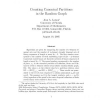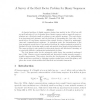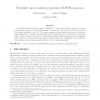102
click to vote
COMBINATORICA
2008
15 years 17 days ago
2008
Algorithms are given for computing the number of n-element diagonal sets and the number of n-element strongly diagonal sets of binary sequences of length at most 2n - 2. The first...
101
click to vote
CORR
2007
Springer
15 years 2 months ago
2007
Springer
Let PCSN p denote a set of p binary sequences of length N such that the sum of their periodic auto-correlation functions is a δ-function. In the 1990, B¨omer and Antweiler addres...
106
click to vote
JCSS
2008
15 years 2 months ago
2008
We study the problem of sorting binary sequences and permutations by length-weighted reversals. We consider a wide class of cost functions, namely f( ) = for all 0, where is the...
102
click to vote
CORR
2010
Springer
15 years 2 months ago
2010
Springer
A coding method using binary sequences is presented for different computation problems related to Catalan numbers. This method proves in a very easy way the equivalence of these pr...
113
click to vote
DCC
2007
IEEE
15 years 2 months ago
2007
IEEE
This paper describes design of a low-complexity algorithm for adaptive encoding/decoding of binary sequences produced by memoryless sources. The algorithm implements universal blo...
101
click to vote
SETA
2004
Springer
15 years 7 months ago
2004
Springer
A classical problem of digital sequence design, first studied in the 1950s but still not well understood, is to determine those binary sequences whose aperiodic autocorrelations ...
107
click to vote
DCC
2004
IEEE
16 years 1 months ago
2004
IEEE
A d-feedback-with-carry shift register (d-FCSR) is a finite state machine, similar to a linear feedback shift register, in which a small amount of memory and a delay (by d-clock c...



